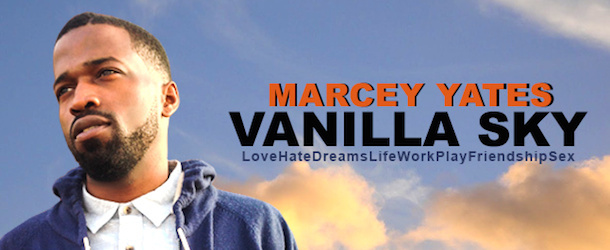by Kekeli Dawes
Critiquing hip-hop’s supposed penchant for materialism, short-sightedness and misogyny can be common fodder for emcees who simply seek to separate themselves from the moral shortcomings of popular culture.
But Omaha's Marcey Yates pushes himself to take a step down from any lofty soapbox, to stop simply observing — he pushes himself to evaluate situations through someone else’s eyes, to find deeper meaning. He says rappers forget to look at other perspectives when they write.
“I think they do a lot, and a lot of times they leave the woman’s perspective out,” Yates says.
This Wednesday, Yates, (aka Op2mus), will perform tracks from his March released double album, Vanilla Sky / Social Studies, at Celebrate Omaha Gives at Slowdown on a billing with Twinsmith, Laura Burhenn (of The Mynabirds) and Edem Kegey.
Where Yates’ previous release, The MisEducated Scholar L.P. reads as a personal journal, Vanilla Sky and Social Studies serve as direct social commentary on two fronts: personal relationships and the moral contradictions of hip-hop today. Yates pulls from personal experience before widening the scope to reveal the roots of larger universal issues like trust, sincerity and insecurities.
Yates says he finds that speaking honestly from personal experiences adds to his personal growth, but sets himself apart as an artist.
“This is me opening up more. I want people to get to know me, but also take a stance other emcees aren’t taking. They aren’t making songs like this. They don’t make songs like that. Simply, they don’t. And this is real genuine stuff, and not having to talk about drugs, guns, bitches and ass-shaking. I’m thinking about things that happen in my life and things people can relate to, but also getting to a story where they have to think about it.”
Throughout the two albums, Yates calls out the moral shortcomings of popular hip-hop. On “Sky Is Falling,” he takes aim at lazy emcees: “100 million records but none of them tight.” And on “Can We Take it Back,” featuring Conchance, he criticizes how the current “state of hip-hop” is “callin’ out our women.”
But Yates is still peeling back the layers to see the other side of things, understands why this often happens — it’s really about the audience, he says.
“You’re trying to make music for people to like a certain way. So you make the standard music that people make. But that’s only one side of it. When I came out with The MisEducated Scholar, I really catered to real hip-hop heads and that, but I asked ‘What am I leaving out here? I want women to enjoy this music too.’”
This is one of the reasons why Yates points to Vanilla Sky’s “Relationships” and Social Studies’ “Leave From Here” as central tracks of the double album release. They both push the perspective.
“Leave From Here” is a break-up song, a farewell to an ill-fated relationship. It feels like an apology song; it stylistically follows the form of hip-hop ballads, like Jay Z’s “Song Cry” or Murs’ “First Love.” The song’s mood follows suit to the sample, Evelyn Champagne King’s “The Show is Over”.
In the song, Yates remembers working through a relationship made sour by difficulties that come with life — despite his musical successes outside of the home, love still runs its course. Rather than get caught up in confusion and miscommunication, after realizing that his partner needed time alone to grow, he knows it's “time” for her to go.
“It’s about letting go,” Yates said. “You have to learn to let go. You have to learn how to let people go on their own. I can only tell her so much, you know, but I don’t want to get in the way of her progress or her learning her life lessons.”
“Relationships” is a different sort of break-up track. This song’s narrator is clearly stepping out of an unsatisfactory relationship. It feels like a fun, upbeat break-up song about shrugging off some person that you’re better off without, and on the surface, the hook even comes off that way: “I’m leaving / I told her ‘I’ll be back again’ / I traveled the world, I’m travelin’ round with different friends / Don’t take it personal, girl, we can still be friends.”
But as the track goes on, Yates pulls away from his perspective of wanting a more serious relationship to her point of view, a woman busy with work and school who’s not looking to settle down.
“I come from the standpoint where I can understand where they are coming from too. I can understand a situation where they don’t have time for that.”
From both perspectives, as man looking for a stable relationship, and a busy, professional woman enjoying the casual hookup, Yates then weighs the pros and cons.
“I can also see how people before me may have scarred them with emotions of lust without learning to trust. The homie can’t kick it because they don’t really know what his intentions are. That’s what I try to touch on is a girl’s perspective to the guy’s perspective on this new thing girls do, but then it ask why we act like that.”
Like The MisEducated Scholar L.P., Yate’s work is still autobiographical, but now the scope of Vanilla Sky / Social Studies is much wider, a paradigm shift of sorts.
On Vanilla Sky’s “Take it Back,” Yates challenges not only emcees, but us as well, to work on our own growth. “Lead by example / I can show the door / But they got to handle it and open to explore.”
“My thing is to work on undoing things that are set into stone, man,” Yates says. “The standard. People are thinking a certain way, and with my music I try to undo it. As I am trying to undo it, I try to describe why you’re even thinking like that.”
Kekeli Dawes is a Hear Nebraska editorial intern. Reach him at kekelid@hearnebraska.org.




